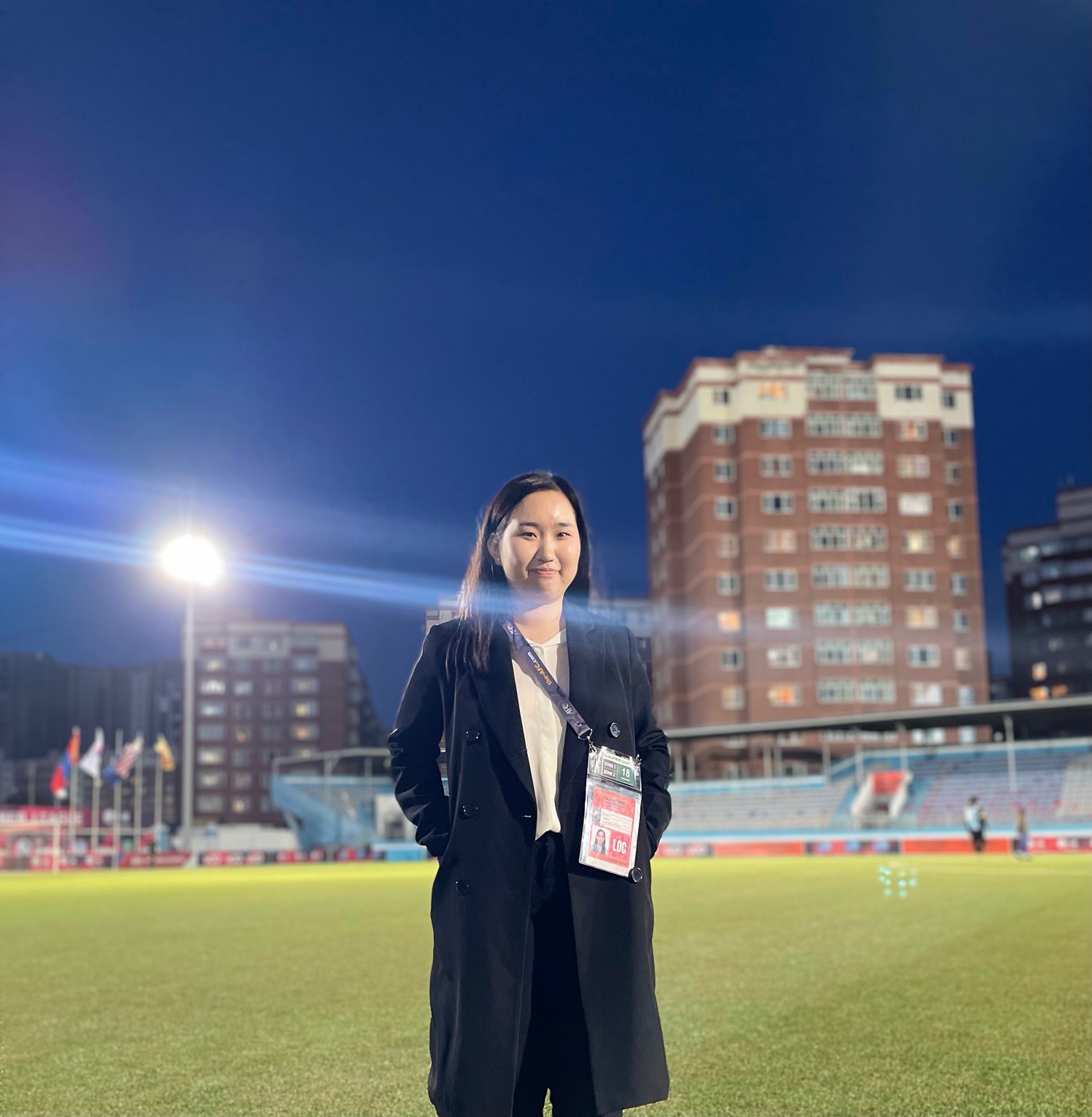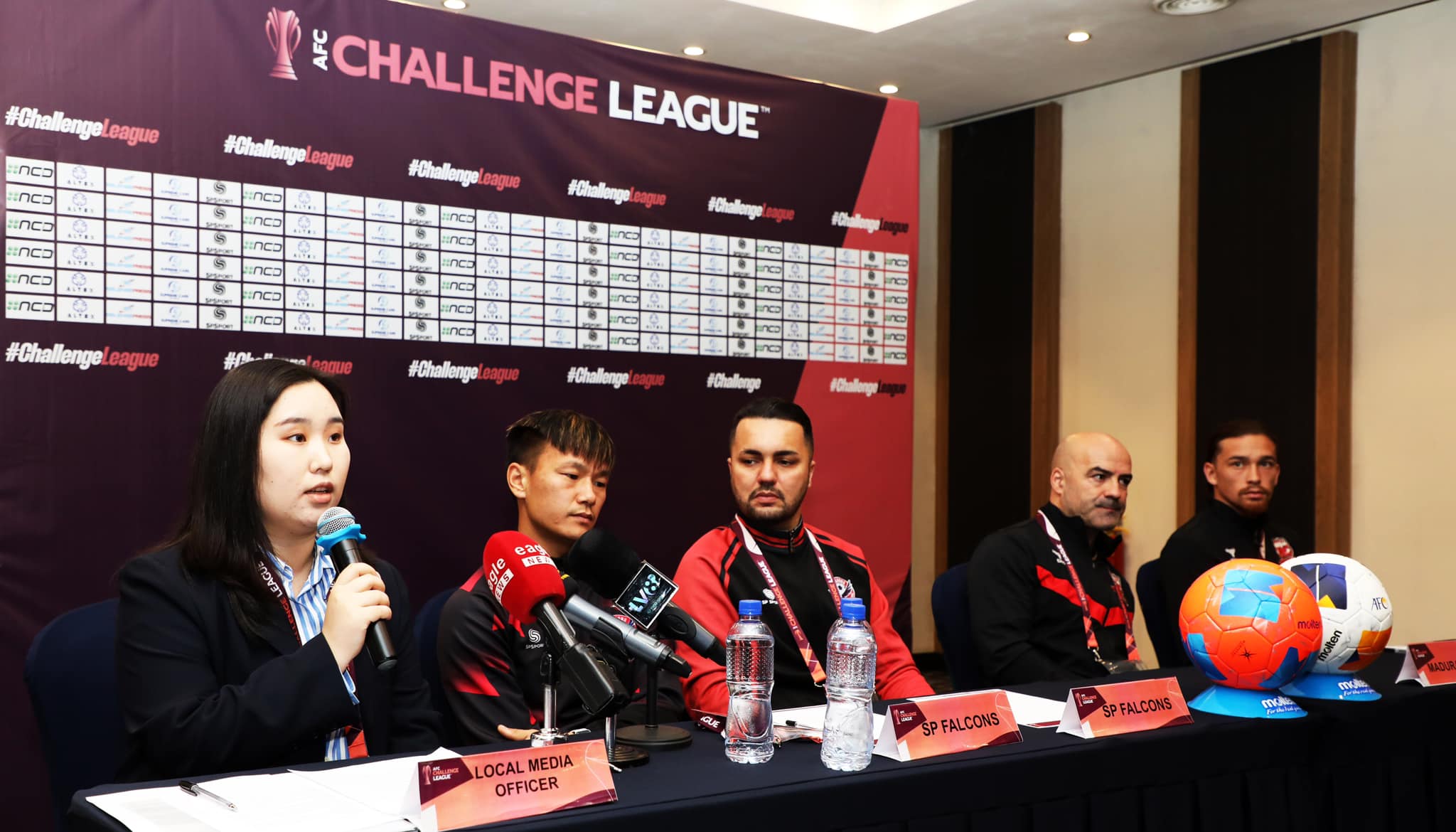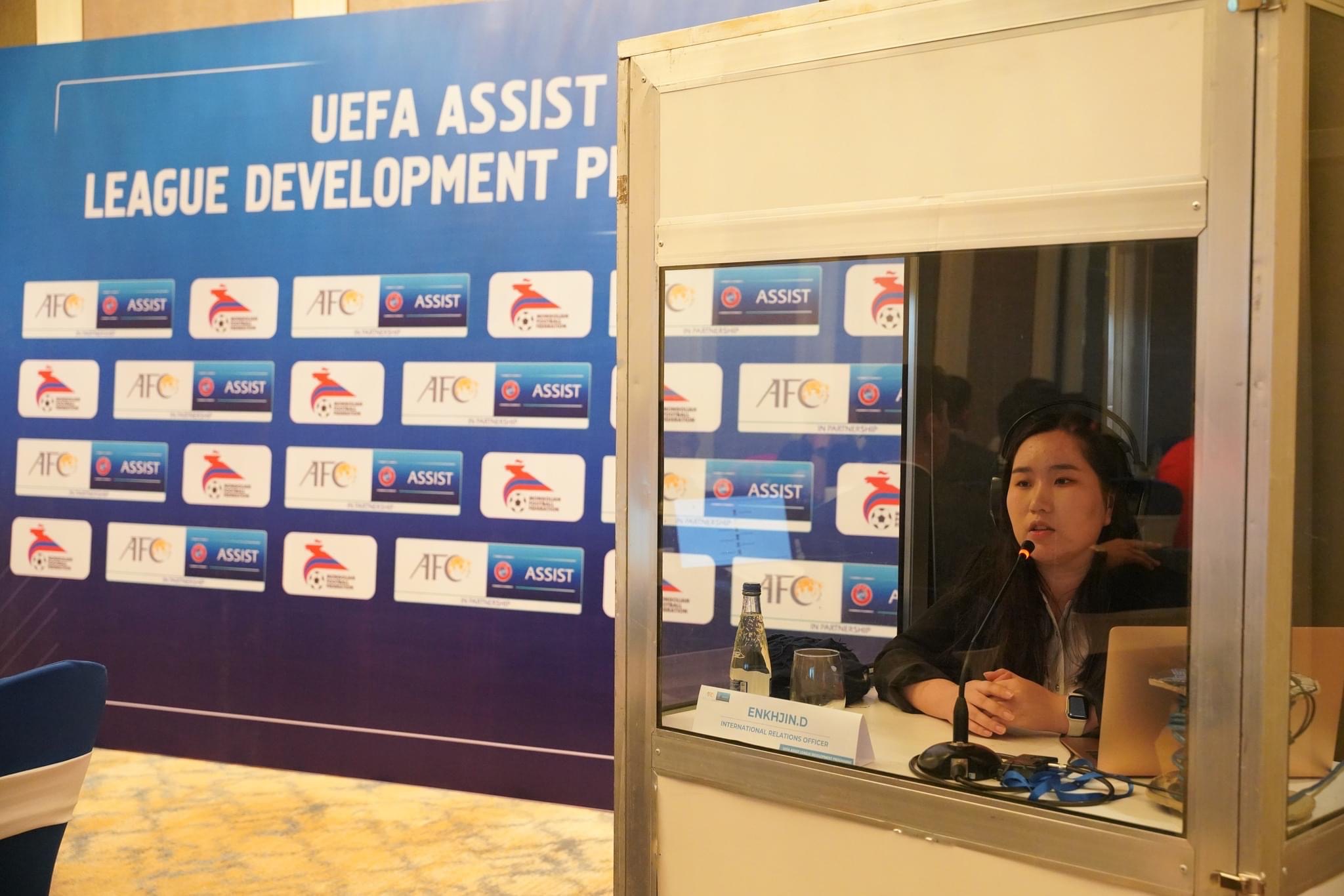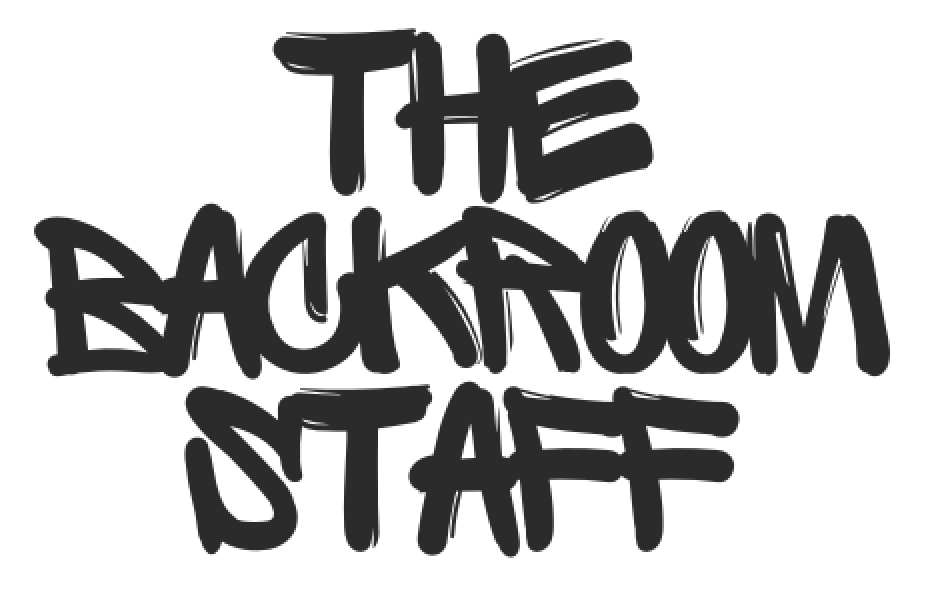Football teams - both national and club sides - regularly travel thousands of kilometers every year for matches and tournaments, with extensive planning and organization behind every trip. In some ways, it’s like being a travel agent—but with far more pressure and a greater number of stakeholders involved!
For Enkhjin Dalaibayar, an international relations officer at the Mongolian Football Federation (MFF), organizing international travel is only part of her job. Enkhjin is a key figure in ensuring matches and events go off seamlessly. From arranging visas and coordinating travel to communicating with match officials and managing press conferences, she handles the full spectrum of football operations.
In this interview, she shares a behind the scenes look at her multifaceted role and the essential logistics that keep Mongolian football moving forward.
The interview has been condensed and lightly edited for grammar and clarity.

[ Background and current role at the MFF ]
I studied international relations in Ulaanbaatar, Mongolia. My goal was to become a diplomat. In my junior year, I did an internship at the MFF. I joined the MFF in 2021 during COVID and got to see a lot of different aspects of football and the organization - I worked on a couple of different projects during my internship. After I graduated, I got a job offer from the MFF.
I started during the AFC U23 Asian Cup Qualifiers in 2021, the MFF was hosting the group stage and the U23 national teams from Laos, Thailand and Malaysia. As it was still during COVID, we implemented a special ‘bubble’ system with strict protocols where none of the match officials, coaches or players from each team would mix with each other or the public. It was quite the start! During this time, I was assisting the heads of different departments with interpretation, translating documents and facilitating communication with the AFC - which I still do in my role today.
Currently, my role includes arranging everything for the national teams (men’s, women’s and all the youth national teams) for all international matches. I help arrange their visas, flights, accommodations, etc. For international friendly matches, we arrange things with the opponent and FIFA/AFC to confirm the match. If we host, there is a ‘local host committee’ that includes any match officials, foreign officials or AFC officials coming to Mongolia - I will arrange their visas and local accommodations as well. I still do a lot of the documentation and communicate with different stakeholders.
I’ve encountered a lot of great people in football and worked with many different football bodies like UEFA, the AFC and FIFA as well as many other federations to organize different aspects of national team games and other projects. I work closely with all the departments in the MFF and have even had a couple of experiences where I’ve traveled with the teams. I went with the women’s U20 team to Laos and worked as the team manager for the Mongolian Futsal National Team for a friendly match in Thailand, both were very memorable!
[ Organizing visas for the players ]
It's a very interesting topic - it always depends on where they are going. Just last week, for example, the U17 team went to Qatar for the U17 Asian Cup qualification. Most of the time, the host association is in charge of the visas, so my responsibility is to provide the information of the visiting officials, coaches and players to the host association in advance and they will provide the visas. But each country is different and has different procedures or different aspects, so it’s always interesting - I think I have over 700 passport copies of all the players and staff due to registration and visa processes! I’d say we’re also contributing to sports tourism!
To avoid issues like a visa being denied or an expired passport, we follow a very specific protocol - and we haven’t had any such problems. A couple of years ago though, we were hosting matches and one of the visiting teams provided us with a list of names and we arranged the visas, as usual. But when they arrived, they arrived with different players - who didn’t have a visa! We had to call all the immigration departments, explaining the situation and eventually managed to arrange visas on arrival at the last minute for those players.
"I think I have over 700 passport copies of all the players and staff due to registration and visa processes!"
[ Flights and accommodation ]
When we have foreign teams or officials coming to Mongolia, normally our department is in charge of appointing the ‘local organizer’ - the local guide for the teams, because we need to communicate with the teams through that person. The AFC has a dedicated regulation for this. Whenever a team comes in, we must provide hospitality including certain things like meals, hotels, transportation and LOC for the visiting teams.
There are different challenges depending on which team is coming, for example, if it’s a team from the Middle East, we have to organize different food for them with the hotel. One unique challenge is the traffic in Ulaanbaatar is very, very bad! So we have to advise the teams to leave early from the hotel.
[ What is the process to organize an international friendly match? ]
Normally the process is very simple. The national team schedules their yearly plan and will usually come to us and tell us they want to play a certain team on a specific period of FIFA days.. We can then contact their federation and see if it’s possible. If they agree to play, we start arranging everything (travel, visas, etc) and get confirmation from the AFC or FIFA. Most of the time, the situation is very similar - especially if the proposed match is during the official FIFA windows for international matches.
[ Arranging travel plans ]
This is quite important work for my department. We get the names (of the people traveling) in advance and look for the best flights and accommodation. We want it to be very convenient for the teams - they don’t want to wait a really long time or transit through many countries because it’s hard and tiring for them to travel a lot before their matches.
We have a few players who play in foreign leagues including Ganbayar Ganbold who plays in Slovakia in their Premier League. Whenever the head coach of the national team calls him, for example, we have to get approval from his club for his release. After that we arrange their flight tickets - it depends on when they are released, sometimes they will travel directly into the country where the team is playing but if they have more time, they’ll come to Mongolia and train with the team before going to the host country.
[ Is the MFF also involved in club football - namely the SP Falcons are hosting the group stage of the AFC Challenge League? ]
It’s jointly hosted by the Mongolian FF and the SP Falcons. Everyone is busy with arrangements, there will be 3 match days and we have 10 officials coming from the AFC and two teams - one from Cambodia and one from Indonesia. For the matches and the competition to go smoothly, we have to arrange certain things, like the stadium, the registration of officials and the arrangements for the visiting teams. For these matches, I’m working as the local media officer.
In the Mongolian Premier League - we have 10 teams and the season follows the AFC’s calendar. Starting last year the MFF has been working with the UEFA Assist project - a league development project. However the MFF is looking to organize the league independently in the future so the league can benefit from the commercial opportunities.

[ The women’s league is part of the FIFA League Development program (+ men’s league in UEFA Assist) - what are these programs? ]
As an AFC member association, we have the chance to work with UEFA because they have a partnership to support each other's members. They organize some workshops with specialists and with the MFF and stakeholders from clubs including coaches and players. Then we make an action plan and they follow up with us to help us work towards the goals.
The League Development is similar but focused on women’s football. Last year I worked as a women’s football officer in the MFF and was in charge of the project. We applied for two programs - one was FIFA’s League Development and the other was the women’s campaign and club licensing program. I was in charge of implementing these projects. FIFA supports with specialists to assist you with guidance on the projects and equipment for the league. Because of this support we were able to run our women’s league very effectively this season.

[ Is the MFF working with other FAs or just on the confederation level? ]
Most of the time, our work with other federations is related to matches between the teams and the organization behind them. In September, I visited the Chinese Football Association because we are working with them on some projects. This is one of the best things about my work - I get to meet a lot of people in different associations, especially the people in charge of international relations and women’s football.
[ What are some of the unique challenges Mongolian football is facing? ]
In Mongolia, the biggest challenge is the weather - we have a very short football season from March to October - and July is off because of national holidays. We have a long winter when it’s not very suitable to play outside. For this reason, the MFF built an ‘Air Dome’ nearby in Töv province, it’s fully covered and can host indoor training and competitions.
Another challenge is competing against other sports. In Mongolia, basketball and volleyball are more popular because of the difficult weather and the lack of football infrastructure. If you go to schools, you’ll usually see kids playing basketball and volleyball instead of football. So this is hard for football development. In general, many fans are interested in the national team’s games but not as interested in the domestic leagues.
Futsal is an interesting opportunity. We recently organized a women's futsal league with 8 teams and it’s more popular because of the short duration, everyone gets to touch the ball a lot and it’s more entertaining for spectators, especially kids.
[ What are the goals of the MFF for the next few years? ]
Currently, we are looking to promote grassroots football. We are currently implementing a nationwide project to increase the number of people playing football mainly handled by the MFF. Last year, we had 400 schools and 30,000 players participating which was already a huge success - in Mongolia we have ~840 schools in total. In the short term, we want to increase this to 50,000 players.
In the years before, we had been focusing very much on professional football and improving the game at the top level. But since July 2023, the MFF has new leadership and a new vision to focus on the very base levels of football, starting from the grassroots. Then we can see how we tie it in with elite football.
"the MFF has ... a new vision to focus on the very base levels of football, starting from the grassroots"
[ You’ve been involved in lots of different things at the MFF - what are you looking forward to next in your career? ]
I’ve done a lot of different roles and different jobs. I’ve learned a lot about many aspects of football, I’ve seen how it works from the competition side, how referees work, upper management, etc. I also had the chance to study at the AFC’s Academic Centre of Excellence and complete the Football Management Certificate Edition 4 to become a professional in the football industry.
I would recommend these courses to anyone interested in a career in football! They are open to independent participants and many of them are free. At the end of the courses, there are internship opportunities. I’ve seen a lot of classmates go on and do internships at the AFC or different bodies in football.
For my next step, I’m looking forward to continuing working in football and seeing more sides of the game.
